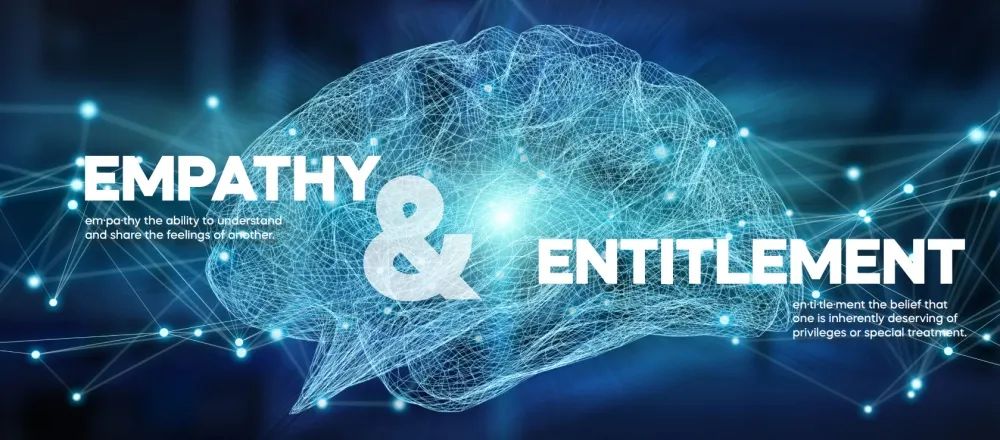
Empathy & Entitlement
November 2022
by rebecca stewart
em·pa·thy the ability to understand and share the feelings of another.
en·ti·tle·ment the belief that one is inherently deserving of privileges or special treatment.
“What a time to be alive!” You could read this phrase two different ways – with unbridled enthusiasm, marveling at the world around us, or with growing disbelief and dismay. In recent years, we’ve seen an uncomfortable lack of empathy emerge, coupled with a growing sense of entitlement. We see it online; we’ve seen it in person – it’s not a new problem, but it has felt exacerbated in recent years. Living in a time of instant communication and unprecedented access to each other has evolved into almost an expectation of having 24-hour access to people. And, with so much of our lives unfolding over social media, we’ve seen a major disconnect in recognizing that there are actual human beings with feelings on the other side of that screen. This has also translated to in-person interactions – we saw this at every level over the last few years.
What a time to be alive.
For our children, this technology-driven world that seems to be in a state of constant upheaval is all they’ve ever known. As adults, it’s easy to get mired down in the hard things and feel like things will never change, but there’s hope to be found in the younger generations, and giving them the tools to make the world a better place is our job. Did you know that – despite what we’ve long thought – kids are not born selfish? University of Michigan researcher, Felix Warneken spent 17 years studying toddlers, and he learned that kids display altruistic behaviors from a very young age.
“What we’ve found is kids have a spontaneous biologically based tendency to care about others,” he told HuffPost. “They help early on, and they do that spontaneously without being asked, offered a reward, or observed by their parents. This makes us believe that human nature is not purely selfish, but we’re equipped with some altruistic inclinations that can be elicited.”1
So, if selfishness isn’t innate, how do we cultivate empathy in our children while recognizing and eliminating entitlement issues? (Spoiler alert: in our kids and ourselves.) For that, we talked with dual licensed therapist Carrie Reeves, LCPC, LAC, who is certified as a trauma specialist and largely works with clients starting at age 7, addressing trauma response and anxiety-related struggles. Carrie is also the proud mom of a 21-month-old and licensed foster parent, along with her husband.
Recognizing Entitlement
When talking about entitlement, we have a societal tendency to throw younger generations under the bus, but let’s not forget to turn the mirror on ourselves and examine our own tendencies (and complicity in creating these issues). We asked Carrie what parents need to recognize both in themselves and their children regarding entitlement. First, she says, we must check our Internal Motivation. “If we are attempting to parent the heart and not simply external behaviors, it is important to start with assessing our own motivations and desires.”
Example: Most parents desire a well-behaved child to some extent, but if I am demanding certain actions from a place of self-pride, I may be missing the mark. After all, wanting my own way for my sake without regard for others sounds like entitlement to me. The better I am at noticing when I expect special treatment or for things to go my way, regardless of the cost, the clearer it will be for me to ascertain these qualities in my children.
Second, Carrie advises us to check our Behavioral Responses. “If I or my child is tempted to lash out at others when an expectation is not met, there may be a struggle with entitlement.” For example, if our child earns a poor grade in school, who are we holding accountable? Our child or their teacher? When we or our child has an issue with someone(s), are we immediately playing the blame game, or are we examining our/their role in the situation? Carrie notes that if we cannot move past comparing others’ experiences to our own, it might signify that we are struggling with entitlement. “This isn’t to say,” she clarifies, that “there is not an initial response of frustration, but do we have the tools to move through that felt frustration and differentiate between authentic need and entitled expectation?”
Self-check, as parents, how might we have inadvertently encouraged entitled behavior? Carrie highlights:
- Over-guidance/control – When parents struggle to allow their child to age-appropriately resolve conflict with peers, independent of parental intervention. Carrie explains that she’s not saying there is no room for parental involvement and engagement with your child is vital, but “allowing them space to process and problem solve within the safety of your presence can provide more long-lasting tools than solving a child’s interpersonal issue for them.”
- Modeling entitlement – If my interactions with coworkers, family members, and friends indicate that my desires rank above any other values and goals, that’s showing my child that to reach your goals, you needn’t take others into consideration.
- Lack of empathy in parenting – By failing to display empathy for my child’s experience, I am actively ignoring some of my child’s needs. When our needs are not being met, we frequently develop maladaptive ways of attempting to meet them (such as demanding they be met at all costs to anyone else around us) and/or confusing a need with a want.
- Inconsistent parenting – “We all do it,” Carrie reassures, “so let’s normalize that.” But let’s also recognize that when we draw a boundary and then give in because we’re tired or don’t want to deal with big behaviors, we encourage entitlement.
Cultivating Empathy
Though Carrie tells us that studies have shown that children are incapable of genuine empathy before age 7, she believes that empathy manifests itself differently depending on the stage of development. In short, it’s never too early to start developing our child’s emotional intelligence.
So, how do we get the empathy ball rolling?
- Start with the child’s feelings.
Carrie notes that somewhere along the way, there has been an “inadvertent communication that feelings are bad or unacceptable.” As adults, we have this tendency to hold kids to a higher standard – we aren’t as accepting of the fact that kids also have bad moods or have a touch of the blues, for whatever reason. It stands to reason, says Carrie, that if we hold onto the belief of feelings being bad/unacceptable, then “I am more likely to reject/ignore feelings in both myself, and others.”
As a parent, we must normalize conversation around emotions. Carrie suggests practicing mind-body exercises like body scans and yoga, limiting screen time, and talking about what to do with feelings when they come. Also, encourage gratification delay and talk about the gifts that come from waiting and sitting in discomfort.
Ultimately, says Carrie, “When I am ready to be aware of how my actions and desires impact those around me, I am empowered to see more than my want or need in isolation. It tempers my desire and alters my perspective.”
1 Kids Are Not Born Selfish. Here's How To Keep Them That Way. | HuffPost Life
Originally printed in the November 2022 issue of Simply Local Magazine
Never miss an issue, check out SLM's digital editions here!





